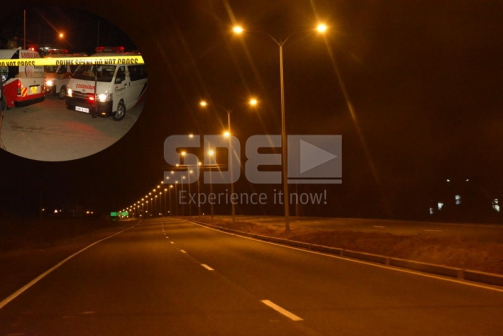
In the unfortunate event that you survive a horrific car crash near the Jomo Kenyatta International Airport (JKIA) at noon, chances of you dying in a crippling traffic jam as an ambulance driver desperately fights to evacuate you to Nairobi West Hospital, Kenyatta National Hospital or The Mater Hospital are pretty high.
Indeed, along the entire length of the Kenyan section of the Northern Corridor from Mombasa to Malaba, which claims thousands of lives annually, there is no trauma centre with facilities and professional personnel to rapidly reverse the fortunes of an accident or gunshot victim. Death, it seems, is almost inevitable.
The situation is direr at night. In the darkness of Nairobi’s urban jungle, dangerous vermin crawl out of the woodwork the moment your car stalls with intent to rob, maim or kill. Unfortunately, you are practically on your own because State emergency response and policing is virtually nonexistent.
The Thika Superhighway for instance has three mortuaries at Kenyatta University Mortuary, Ruaraka Uhai Neema Hospital and St Francis Community Hospital in Kasarani, but no proximate accident emergency medical facility.
According to the National Transport and Safety Authority (NTSA) weekly audit, Nairobi recorded 18 deaths in the third week of July. In case of a breakdown or serious accident, motorists often depend on the handful of private recovery operators while nervously glancing behind their shoulders for criminals.
Hezekiah Othieno, a city motorist, dreads driving on the isolated Eastern and Southern by-passes.

“Driving after midnight in Nairobi requires extra caution, especially along the by-passes because they are rarely on police or NTSA’s surveillance,” Othieno says, citing insecurity as the main reason many motorists speed late at night.
Law enforcers do not operate ambulances or towing trucks, meaning NTSA, the body mandated with ensuring safety for road users, and the police, are ill-kitted to handle rescue operations. City Hall’s recovery trucks only operate during the day, and solely to haul road users who break by-laws. Towing cranes for evacuating stalled trucks and trailers or those involved in accidents are virtually nonexistent, placing other motorists in danger. Because most Kenyan roads lack working streetlights, many are the motorists who have bought a ticket to heaven, or hell, by ramming into stalled trucks.
In the absence of standby rescue and evacuation facilities owned by the government, only a sole Kenya Red Cross ambulance stationed along Mombasa Road and two others on the Thika Superhighway run by Sinohydro Joint Venture, a contractor who was awarded Sh1.1 billion for maintenance of the superhighway, can race to your aid on that end of the world.
It is a case of towing vehicles and ambulances being mostly owned by hospitals, security firms and road safety organisations. Late last year, the Bob Morgan (BM) security pledged to extend free emergency services to non-clients in distress after it rolled out 12 advanced cardiac life support ambulances for medical evacuation services. Road Safety Volunteers also offer free towing and ambulance services, but at times, get overwhelmed by the incidences of accidents. It does not help that highway patrols by traffic police are not intense, making victims of accidents and vehicle breakdowns an easy target for robbers.
A spot check by The Nairobian along major city roads at night corroborated motorists’ fears. Many vehicles that had stalled along the Eastern and Southern by-passes had the owners missing because they had taken cover in nearby bushes for safety.
“Save for those who have a contract with established rescue and towing service providers, many endure agony and risks if they stall late at night. It is even worse when breakdown operators decline to offer rescue services, citing insecurity,” says John Kimani, a city taxi operator.
Raphael Manduku, who operates a matatu along Ngong Road recounts how he was bullied by a group of drunken foreigners who damaged his matatu extensively in an accident. “Police took so long that the attackers drove away to regroup and came back to beat me up,” recalls Manduku.
NTSA owns five ambulances for operations countrywide, with focus on blackspots on major highways. The agency, however, has no designated ambulance for Nairobi and thus relies on private operators and volunteers.
“This is the challenge we have in Nairobi. We depend on the Kenya Red Cross and Sonko Rescue Team for these emergency responses. In terms of capacity, we are limited,” Samuel Musumba, NTSA’s Safety Manager, concedes.
Pedestrians are not any safer. By-passes, Thika Superhighway, Mombasa Road and Waiyaki Way are intermittently lit, with some areas being in total darkness. This, together with deficient policing, turn roads into death traps.
The Kenya National Highways Authority (KeNHA) Corporate Affairs Manager Charles Njogu, throws the ball in the contractors’ courts, saying, “Within the timeline of contract, they are mandated to deal with such defects at their own cost. Unfortunately, we are still having problems with vandals who destroy streetlights and other road furniture crucial for road safety.”
“Thika Superhighway rescue and evacuation service, he adds, is a pilot project to determine whether we can roll out these services on nationwide roads under our mandate.”
Nairobi County Traffic boss Leonard Katana, terms the problem “a national issue,” while Traffic Commandant Jacinta Muthoni says her department should not be entirely blamed for unsatisfactory policing on roads at night arguing that, “We are supposed to work in collaboration with NTSA. Their roles go beyond crackdown on drunken driving, you know.”
 The Standard Group Plc is a multi-media organization with investments in media
platforms spanning newspaper print
operations, television, radio broadcasting, digital and online services. The
Standard Group is recognized as a
leading multi-media house in Kenya with a key influence in matters of national
and international interest.
The Standard Group Plc is a multi-media organization with investments in media
platforms spanning newspaper print
operations, television, radio broadcasting, digital and online services. The
Standard Group is recognized as a
leading multi-media house in Kenya with a key influence in matters of national
and international interest.


